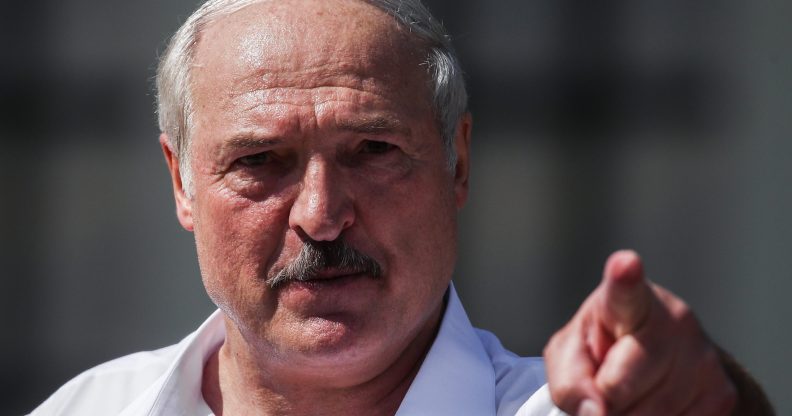Belarus’ marginalised queer community ‘will still face hatred and violence after Lukashenko’s regime is over’, activist warns

Alexander Lukashenko addressing crowds as Belarus continues to revolt against his dictatorial rule. (Getty)
A queer activist in Belarus has warned that even if efforts to remove despot Alexander Lukashenko prevail, the country’s LGBT+ community faces a long road to liberation.
Belarus has been gripped by protests since the official result of an August 9 election allegedly returned Lukashenko to a sixth term in office, with an overwhelming – but disputed – majority.
Opposition candidate Svetlana Tikhanovskaya (now in exile) claims she is the rightful winner of the vote, with British foreign secretary Dominic Raab confirming the UK does not recognise the “fraudulent” result.
Sunday (August 16) saw what local media described as the largest opposition rally “in the history of independent Belarus”, with tens of thousands marching to demand Lukashenko finally relinquish power after 26 years.
Among the banners and placards was a rare sight in the notoriously anti-LGBT+ nation: the six-stripe Pride flag.
Andrei Zavalei is a queer activist who proudly flew the rainbow banner with his LGBT+ family.
Writing in Politico, he explained: “Until this weekend, we didn’t bring our rainbow flags to the protests. For the government, it could be used as propaganda to claim that this whole protest is organised by the west, which is against our ‘traditional family values'”.
“But most of all, we knew that if we did, many of our fellow protestors would not be very friendly.”
While same-sex relations are legal in Belarus, queer people are vilified, considered mentally unwell, and targeted with frequent harassment and violence.
In 2018 the Belarus government – often referred to as Europe’s last dictatorship – called same-sex relationships “fake” and “an erosion of the truth”, reflecting the attitudes of society at large.
Zavalei noted that in recent days, protesters have daubed “go away, pidor” on walls, using the Belarusian word for ‘faggot’ to insult Lukashenko.
“For now, we haven’t been criticising oppositional leaders for being not friendly and not supportive enough,” he added.
“We will negotiate later about the legislative improvements, after it’s possible. After the new president takes up her office.”
After the Holocaust was over, gay men were moved from concentration camps to prisons. §175 was used in W Germany till 1968.
After Lukashenko’s regime is over, #LBGTQI people will still face hatred and violence. We’re fighting for democracy and human rights in #belarus2020 pic.twitter.com/gmePD83IeR
— Пидор говорящий (@ZavaleiAndrei) August 17, 2020
Despite hostility from their fellow anti-Lukashenko protesters, Zavalei and his “pidor family” bravely flew Pride flags as they marched Sunday, determined that LGBT+ liberation be a part of Belarus’ next chapter.
“After the Holocaust was over, gay men were moved from concentration camps to prisons,” he tweeted, noting that Paragraph 175, an anti-gay law used by the Nazis to imprison and kill gay people, remained in place for many years after the end of Second World War. It was abolished in 1994, four years after reunification.
“After Lukashenko’s regime is over, LBGTQI people will still face hatred and violence,” Zavalei continued on Twitter.
“We’re fighting for democracy and human rights.”
Lukashenko, who grabbed total power shortly after being elected in Belarus’ first – and to many, only – free election, has said he will not cave to protesters’ demands.
“There will be no new election until you kill me,” he told angry, striking factory workers Monday (August 17).
He did however offer to amend the constitution to loosen his authoritarian grip on power. Meanwhile, the EU heads of state will meet Wednesday (August 20) to discuss the situation, with his representative Josep Borrell warning sanctions could be placed on Belarus.

